Conversational Marketing
Increasing your direct bookings has never been so easy
Enable guests to book wherever they are.
HiJiffy’s conversational booking assistant is available 24/7 across your communication channels to provide lightning-fast answers to guests’ queries.
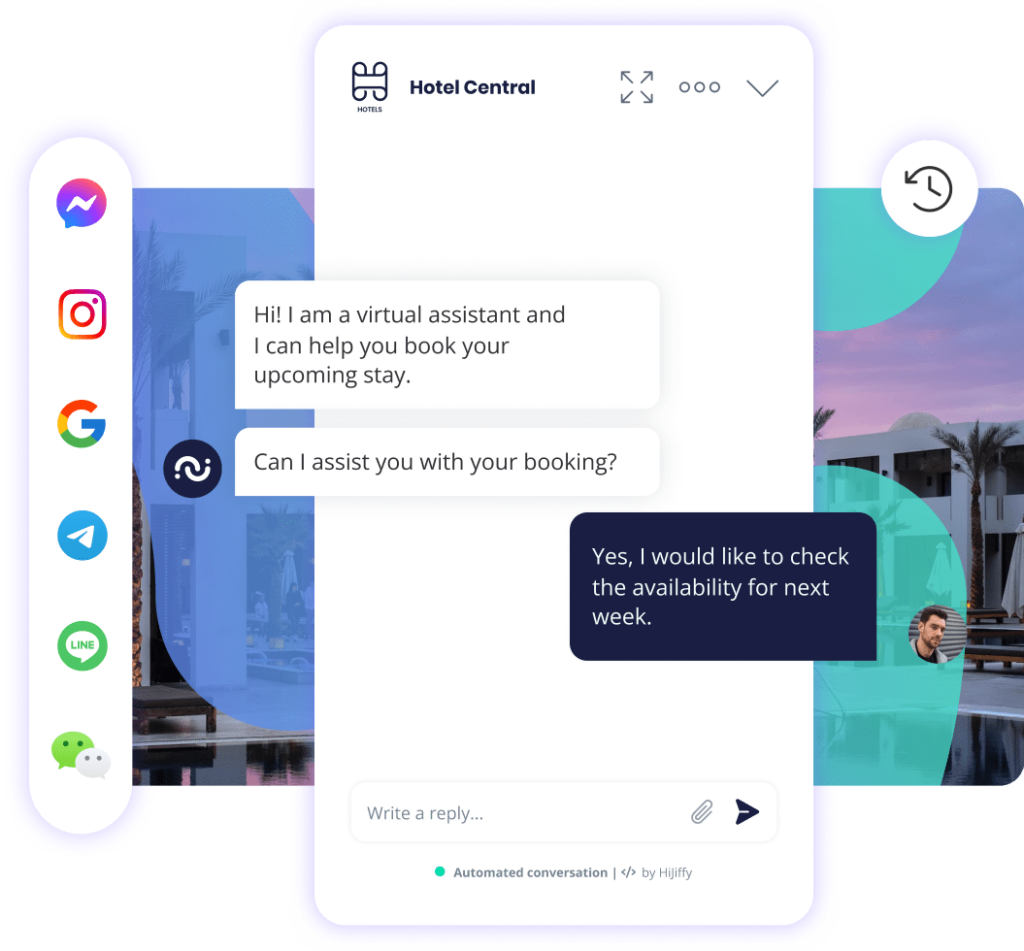
The power of Conversational Marketing for Hotels
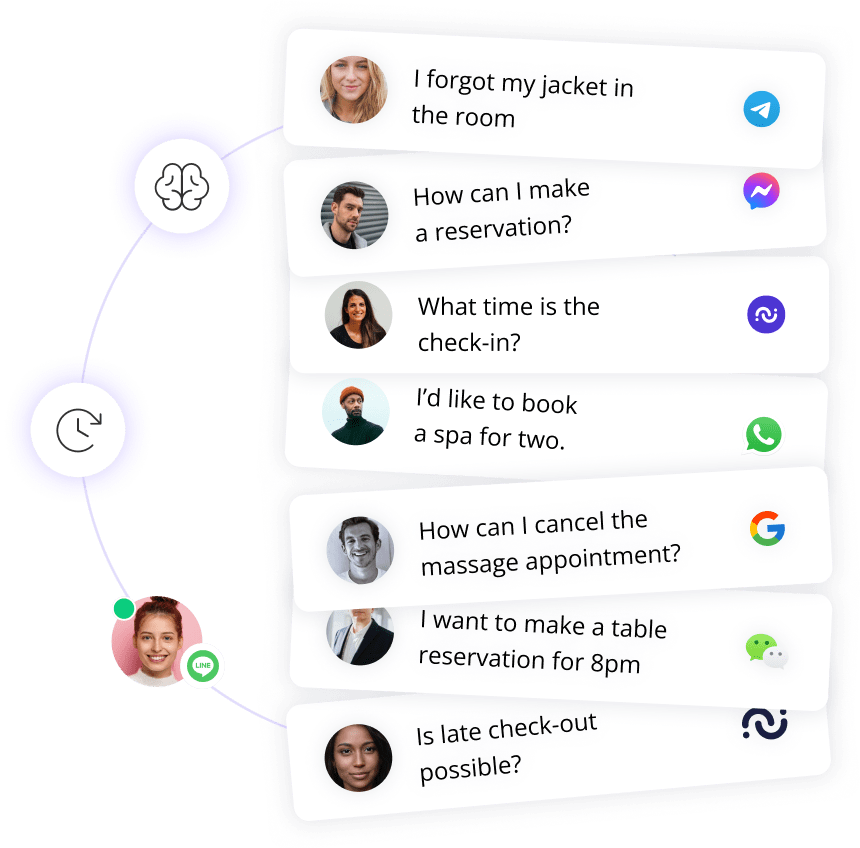
Omnichannel solution
The AI-powered solution is designed to streamline requests from the hotel’s communication channels, including the most popular social media channels (e.g., Facebook Messenger, Instagram) and instant messaging apps (e.g., WhatsApp, Line, Telegram, WeChat) to provide a better overview and monitoring of guests’ enquiries.
Quick to install and easy to use
We take care of your setup and deliver a ready-to-use solution from day one. Moreover, our user-friendly back office is designed for you to navigate easily through your communication with your guest in your most preferred language.
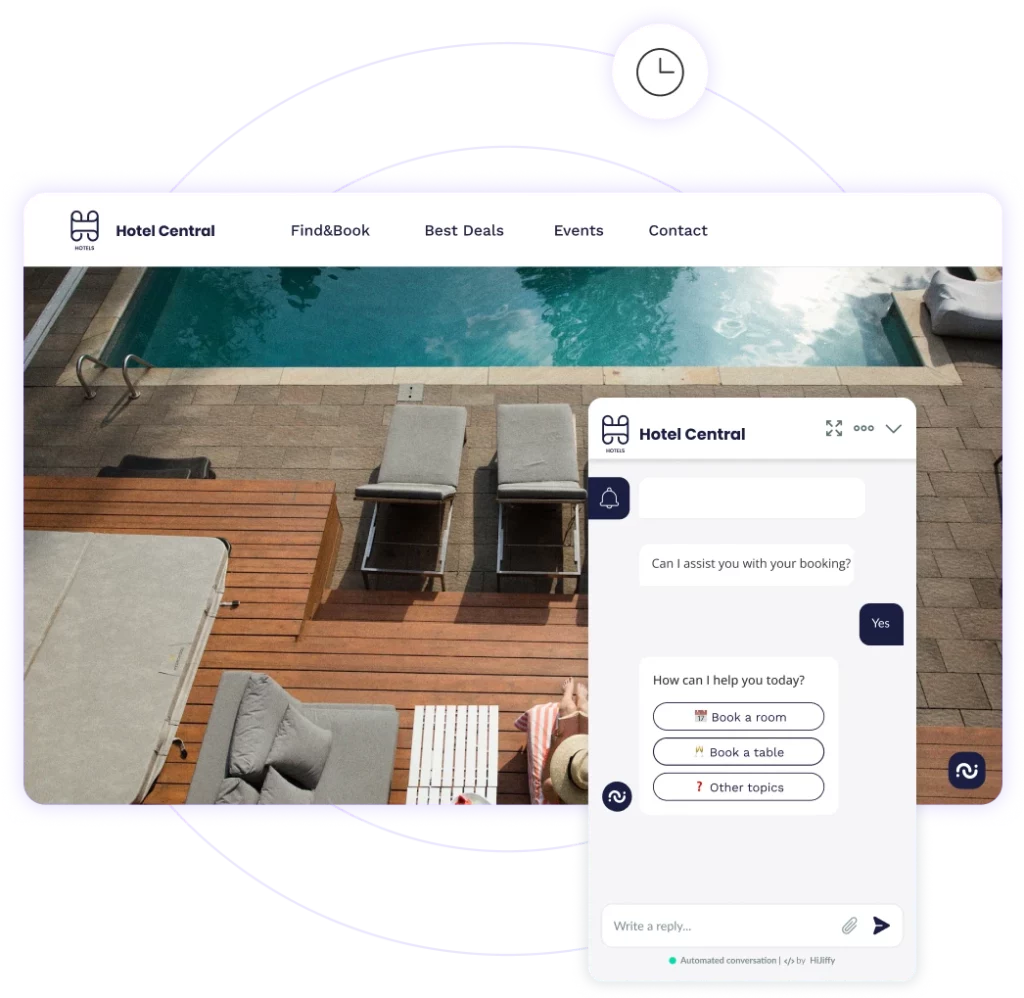
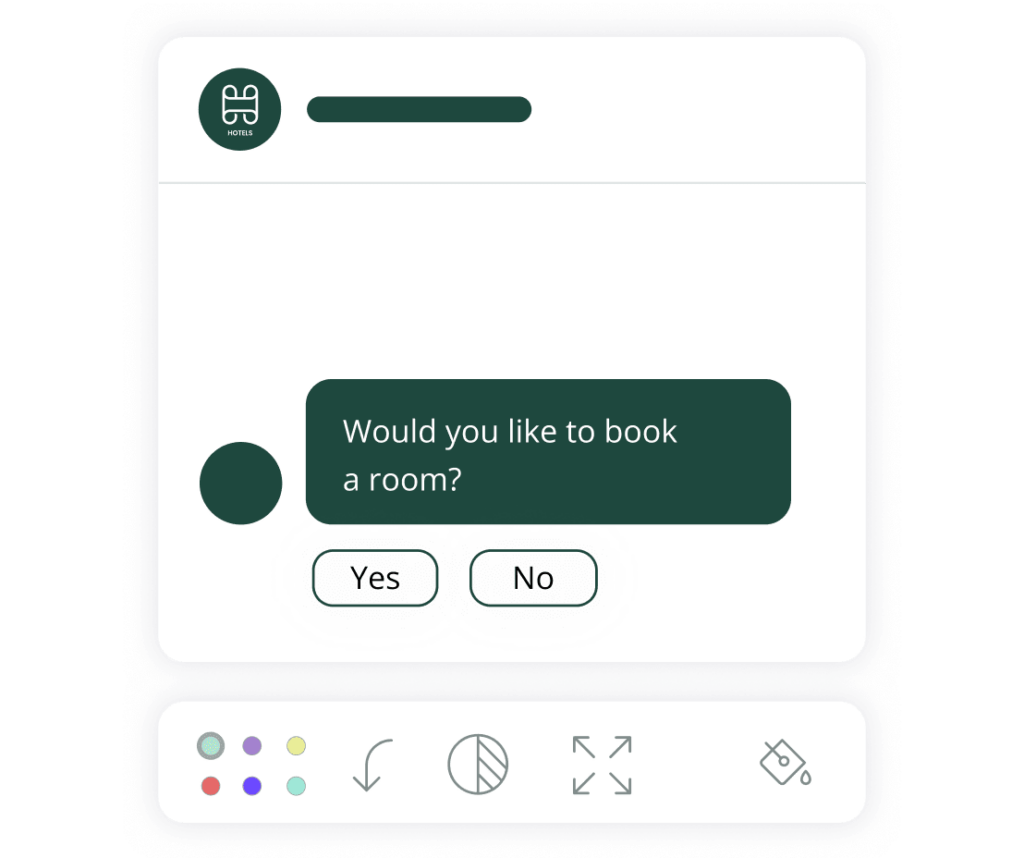
Customise your communication
Make it yours. HiJiffy’s Booking Assistant adapts to your sales flow. Provide a simple yet sophisticated solution to enhance the guest’s journey. Personalise the image of your Booking Assistant to fit your guidelines and provide a seamless brand experience.
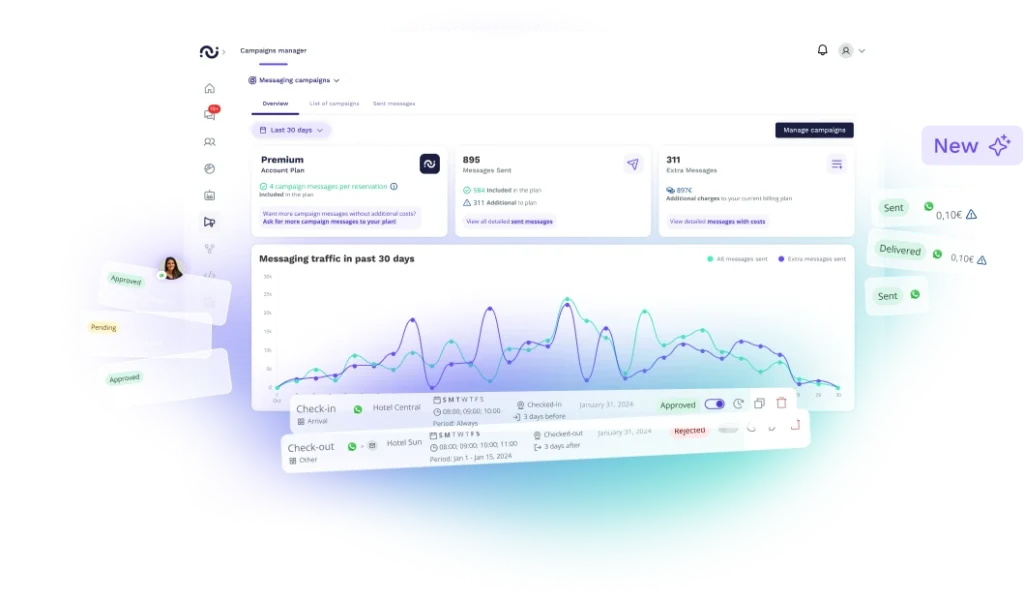
Campaigns Manager
Create and manage automated WhatsApp campaigns across the entire guest journey with the new tool in HiJiffy’s solution.
Digital Booking Assistant Features
AI agent for FAQs and direct bookings
AI virtual assistant guiding users through the booking process and providing answers to FAQs, saving time and reducing workload
Behavioural marketing campaigns
Push personalised messages according to specific pages on the website and interactions in the user journey.
Smooth handover to human agents
A seamless transfer of the conversation to staff if requested by the user or if the chatbot cannot resolve the query automatically.
Request a quote
Travellers can request a personalised quote for their stay.
Widget personalisation
Customise the chatbot interface accordingly to your hotel’s brand guidelines.
Email to chatbot automation
Automate your email inbox with canned responses directing users to the chatbot to resolve user queries instantly.
Click to call
Provide an option to call a human agent directly from the chat if a guest’s request cannot be solved automatically.
Price comparison
Activate the possibility to display the price comparison range of your rooms across various platforms.
Streamlined inbox for all your channels
Centralise and manage conversations across your channels: website chat, Facebook Messenger, Instagram, Google My Business, Line, Telegram, WeChat, Booking.com, WhatsApp, SMS and email.
AI specialised in hospitality FAQs
Over 200 hospitality-specific FAQ topics available for hotels to train the chatbot, and the possibility of adding custom FAQs according to your needs.
CSAT score metrics
Collect and access users’ feedback to evaluate the performance of the chatbot and individual human agents.
Customised automated workflows
Customise workflows that are triggered throughout the booking process.
Conversational Marketing: FAQs
What is conversational marketing?
Conversational marketing in hospitality has proved to be a powerful tool for increasing user engagement.
By making interaction with your company easier for your customers, you will be able to convert more qualified leads. In other words, conversational marketing isn’t simply about attracting new clients but also the essential information that comes with it. As a result of this, it may help you get new consumers, and increase your revenue.
What are the core aspects of conversational marketing?
- Conversations may be scaled up or down
Because discussions occur at the client’s convenience, all dialogues must be scalable. A consumer isn’t concerned with whether you are chatting with 50, 500, or 5,000 other people; they’re just worried about the problem they are trying to solve. This is where chatbots can help.
Conversational marketing bots make it feasible to provide 24/7 service by delivering solutions to frequently asked queries based on existing data. However, although bots provide instant access to information or a person, businesses should not forgot human contact in the name of efficiency. A balance can be maintained by including human inputs into the bot’s functioning.
- Conversations take place at the pace of the consumer
Conversational marketing is characterized by its asynchronous nature. Meaningful discussions should occur whenever and wherever the customer wishes – whether in real-time after they have finished their meeting or later that night when they have a free minute. While companies must be able to communicate with customers in real-time on a conversational marketing platform, it is as crucial for them to be able to complete a discussion at the speed that the consumer wishes to.
- Context is a necessary component of every conversation
Conversations need context and should get wiser as you gather more data. There’s a purpose for it. Firstly, consumers expect it. Consider this: If you phoned a firm yesterday to report a fault in a product and then spoke with them the following day to get return instructions, you’d expect them to have access to past conversations and know which product you’re returning. Secondly, the context makes communicating easy with the help of conversational marketing tools.
Without it, bots or support reps would have to ask the same qualifying questions repeatedly, wasting their time and patience. Any customer service executive will tell you how tedious it is to keep repeating your account number to numerous departments. People seek fast and easy answers to their questions. Thus, CRM should be part of your conversational marketing plan because to be helpful; you must know a lot about the consumer and show it in the discussion.
- Conversations meet clients where they are at in the process of buying
Giving your audience something of value and meeting them where they are is all about inbound marketing. Conversational marketing is just a tiny portion of this, owing to the widespread use of messaging and new tools and technologies.
Moreover, most people would not be compelled to contact a number if they could send a quick chat message and get a link to a knowledge base article instead. This implies that discussions should take place on the most convenient channel for your consumer – whether that is over a call or on Facebook Messenger, with a live person or a machine.
What to consider before building a conversational marketing strategy for your Hotel?
Here are some suggestions you should consider for your hotel marketing strategy:
- Firstly, choose the location where you want your interactions to occur.
- The first step in putting your conversational marketing plan into action is to identify the pages on your website where you want your conversational bot to interact with visitors.
- Select pages of your website that get both the highest traffic and visitors with an increased desire to purchase. This will maximize the number of interactions and your outcomes.
- Create a flowchart for your talk with examples of conversational marketing.
- Then, after you have decided where you want your bot to be located, you can start thinking about how you want the bot to communicate with you.
- Determine what kind of information you need to collect and how many questions you need to ask based on your conversational marketing strategy and the customer journey phases that page visitors are in.
- When creating multiple conversation flow types to ensure a positive client experience, aim to make the discussions as essential as possible. People want their interactions with your firm to be seamless, and they expect to get answers and directions as promptly as possible from your organization.
What are the advantages of using conversational marketing
Conversational marketing is a great help for hoteliers and guests.
While guests find it easier to communicate with the brand and to get their queries resolved, hoteliers will find retaining customers and attracting new ones easier.
Here are the main benefits and advantages:
- Enhanced lead generation
By offering a platform for guests and prospects to communicate with your organisation engagingly, you can improve customer experiences and convert more visitors into paid customers. As long as you ask the correct questions at the right time, conversations help you convert leads and also benefit your sales team.
- Improved interaction with the client
Talking to your website visitors is a great way to know them better and get the data you need to qualify them further. You’ll be able to tailor your communication, give them relevant messages, and engage with them meaningfully based on their preferences and where they are in their buyer’s journey. You may conduct these meaningful discussions around the clock to help you create confidence in your organisation throughout the purchase process and further enhance your client connections.
- Purchasers will go through your sales funnel more quickly
When you integrate your marketing operations into the actions of your sales team, you are more likely to successfully move customers through your marketing and sales funnels. Using live chatbots, you can deliver quality leads straight to your sales agents and schedule appointments with sales agents in real-time.
How to kickstart your conversational marketing strategy
Now that you know how conversational marketing works and its various advantages, you must be wondering how you can put it into practice. Well, here is how:
- Chat, rather than forms, is more effective in generating leads
How does it affect your website if you provide people with the ability to quickly start discussions on your website rather than requiring them to fill out forms before they can speak to anyone? Increased conversion rates, more chances, and a more personable experience with the consumer are benefits that most organizations enjoy due to conversational marketing.
Using a conversational marketing chatbot, you may initiate a discussion with visitors who click to download now, contact sales, or arrange a demo. This does not mean that the interaction must conclude; you may keep the dialogue continuing and continue pushing individuals through your funnel rather than requiring them to wait for another follow-up email if that is what they want.
- Instantly understand leads and what they want
It takes days of marketing automation and nurturing emails to qualify leads traditionally. However, businesses must reply to authorities within five minutes of receiving them to have the highest chance of preparing them. Any longer than that, and you will see your chances of qualifying the lead drop by a large percent.
Conversational marketing with bots enables you to be accessible to new leads at any time of day or night via conversational marketing. Instead of requiring leads to wait for follow-up emails, chatbot systems can learn who those leads are and what they want in real-time.
- Instead of asking qualifying questions yourself, let the bots do it for you
Create your bot using questions comparable to those you currently ask on form fields or first qualification calls. The bot will then engage in a dialogue with the lead to better understand what they are trying to communicate. This will also assist the bot in recommending the following actions to the person who is interacting with it. Responding more quickly and ensuring that your representatives speak with the appropriate individuals at the proper time would benefit you both.
- Predict the next step to move leads through your functional chains
Bots are excellent at engaging and understanding leads, but nothing matches face-to-face connection with real people when clinching the deal. That is why bots employ intelligent routing to link leads to your sales team and even arrange appointments for them on your behalf, allowing your salespeople to devote their full attention to closing sales deals.
With intelligent routing, chatbots for conversational marketing will always ensure that the appropriate leads are sent to the right salespeople. If you have numerous sales representatives working in the same region, information may be distributed on a rotational basis to each representative.
Bots may organize appointments for eligible prospects immediately from chats using the calendars of the sales representatives who have connected their accounts. Your sales staff will enjoy that their calendars are filled with high-quality meetings when they arrive at work each day.
How can chatbots help with conversational marketing?
Using a Chatbot is a cost-effective approach to get things started and here are a few examples of how chatbots might be of assistance:
- Answer frequently asked questions (FAQs) or customer-specific queries where data is already accessible
- Automatically qualifying leads
- Promote upcoming events, goods, and content on your website
- Make appointments for meetings
- Contacting customers and prospects for feedback
What makes HiJiffy's conversational marketing chatbot better than the competition?
When it comes to conversational marketing apps and promotional upselling messaging, HiJiffy is a preferred choice of +2100 hotels worldwide. Here is why:
- Experience enhanced conversations: HiJiffy enhances interactions with visual user interface components (e.g., buttons, calendars, maps, carousels, photos, and more), assisting with interactive elements when a conversation isn’t the most efficient method of conveying information. Everything is done to offer a one-on-one experience throughout the process.
- Automate conversion: Integrating HiJiffy’s interactive conversational app with property management systems, booking engines, customer relationship management systems, and maintenance and housekeeping tools are ideal for an automated workflow. As a result, you will enhance the user experience and significantly influence the customer journey, including the conversion rates for direct reservations.
- Enjoy flexibility: Rather than being restricted to text-based interactions, conversational applications are the next stage in developing the classic NLP or rule-based chatbots, and they allow traditional booking agents to interact with customers with more flexibility.
- The text meets visuals: Incorporating a blend of text-based communication and visually appealing components, HiJiffy is changing how hotels, chains, or independent ones, engage with their customers.
- One app for multiple channels: Another essential feature of HiJiffy’s conversational software is its ability to work across several channels. In addition, the solution may operate on any messaging channel, including those found on the hotel’s website, inside an app, or on a third-party messaging platform such as WhatsApp, Facebook Messenger, Instagram, Google My Business, etc.,


